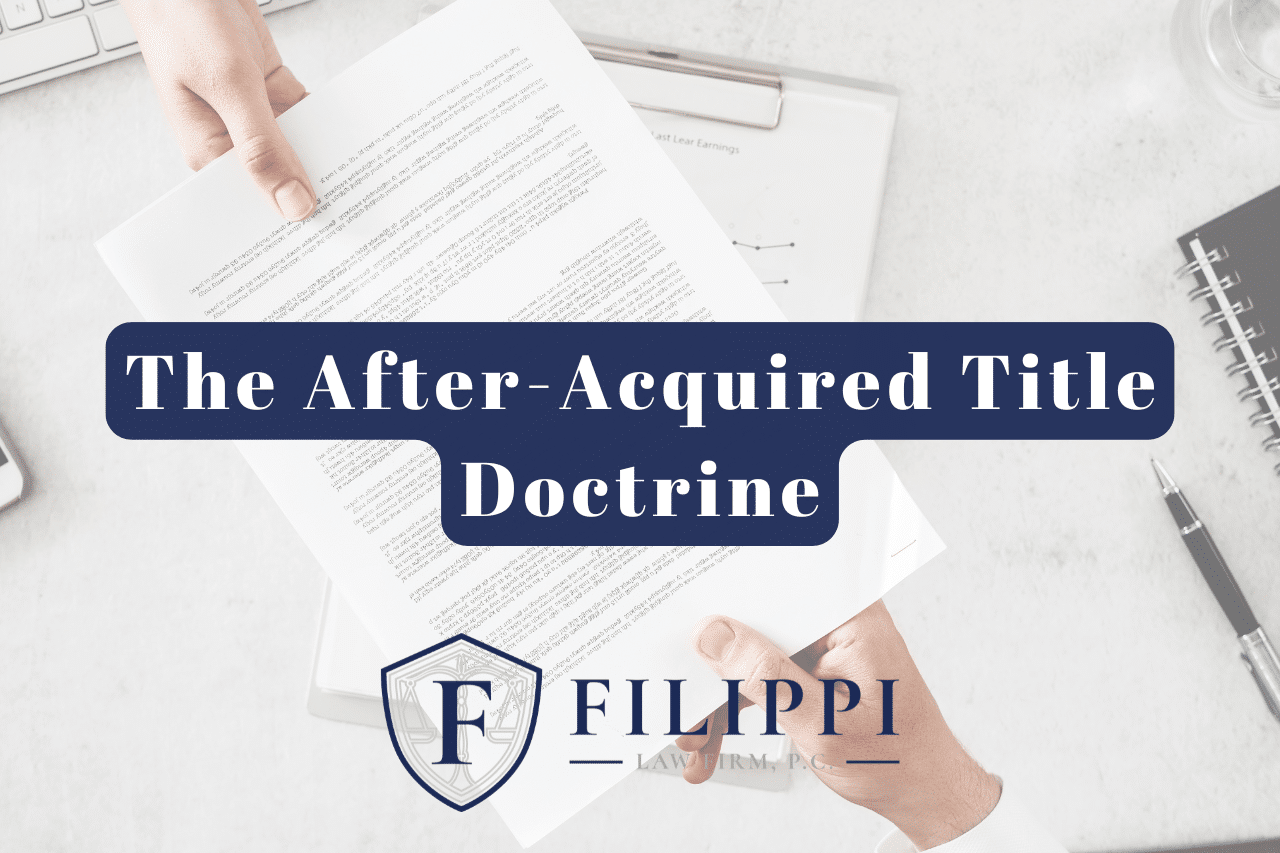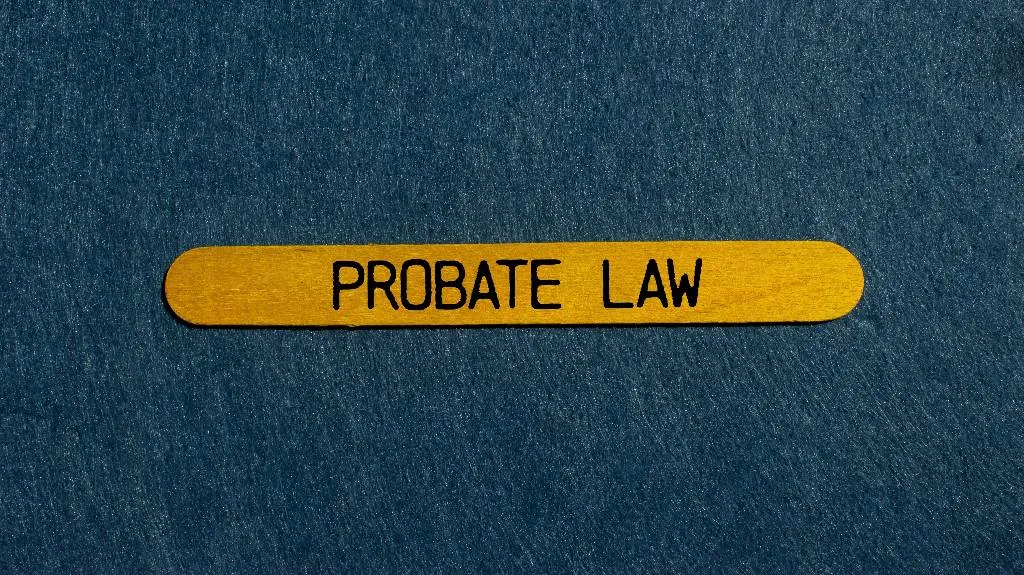Introduction to The After-Acquired Title Doctrine
The After-Acquired Title Doctrine is a legal principle that frequently occurs in California estate planning, despite the fact that it is relatively unknown. This principle is very important in real estate transactions and can significantly influence the manner in which property is transferred, particularly with estate planning.
At Filippi Law Firm, P.C., we are committed to providing our clients with the information necessary to make informed decisions about their estates. The After-Acquired Title Doctrine, its implications, and the importance of understanding it for effective estate planning, will be explored in this article.
What is the After-Acquired Title Doctrine?
The After-Acquired Title Doctrine is a legal principle that is applicable to real estate transactions. In essence, it requires that title automatically vests to the grantee of a deed when a person purports to convey an interest in real property that they do not own at the time of the conveyance but subsequently acquires an interest. This doctrine is founded on the principles of equity and fairness, which prevent the grantor from unduly benefiting from a future acquisition of title when they have already sold or transferred the interest to another party.
What is the operation of the After-Acquired Title Doctrine?
The following example illustrates the operation of the After-Acquired Title Doctrine. Suppose John, under the impression that he owns a piece of property, transfers it to Sarah. John didn’t own the property at the time of the transfer, which was concealed from both parties. Thereafter, John legally obtains title to the property’s. However, under the After-Acquired Title Doctrine, title to the property automatically vests in Sarah, the grantee under the previous John-Sarah deed. This is even though John did not own the property at the time he attempted to convey it.
This doctrine assures the grantee of a deed receives the full benefit of the agreement they engaged in, thereby preventing the grantor from exploiting the situation after acquiring the title.
Basis for the Doctrine: Historical and Legal
The After-Acquired Title Doctrine has its origins in common law, which dates back centuries. The doctrine is codified in California under Civil Code Section 1106, which states that “where a person purports to grant real property in fee simple by proper instrument and subsequently acquires any title or claim to such property, the estate which such person thereafter acquires passes by operation of law to the grantee, or his successors.”
This common law doctrine is firmly established in California by this statute, rendering it a critical factor in all real estate transactions, including those that involve estate planning.
Implications of the After-Acquired Title Doctrine in Estate Planning
It is crucial for estate planners to understand the After-Acquired Title Doctrine when dealing with the conveyance of real property. The reason for this is as follows:
1. Guaranteeing Clear Title: It is essential to verify that the grantor owns the interest being conveyed in the property and that the status of title is clear when drafting wills, trusts, or deeds. If the grantor subsequently acquires title to the property, the After-Acquired Title Doctrine provides a protection to the grantee, in that they are to receive the interest in the property. However, this can create complications if the grantor’s estate plan did not anticipate this possibility.
2. Preventing Legal Disputes: A conveyance of real property to heirs or beneficiaries of an estate is frequently an important component of a comprehensive estate plan. If a grantor attempts to transfer a property that they do not yet own, disputes may arise among the beneficiaries if the title is later acquired. The After-Acquired Title Doctrine should be properly accounted for to prevent these disputes by ensuring the grantor’s intention is fulfilled.
3. Effect on Trusts: The After-Acquired Title Doctrine will influence the management of property in the context of trusts, particularly revocable living trusts. If done correctly, property can still pass to the beneficiaries of the trust if a settlor identifies it in a trust with the belief that they own it, but they later acquire the title to it. It is important that trust documents reflect any after-acquired titles and that estate planners remain vigilant in monitoring property acquisitions.
4. Tax Consequences: The doctrine may also have some tax implications. Property taxes, estate taxes, and capital gains taxes must be accounted for when a property’s title is transferred under the After-Acquired Title Doctrine. When formulating estate plans that involve real property, estate planners should take these prospective tax implications into account.
Practical Procedures for Estate Planners
Considering the potential complexities introduced by the After-Acquired Title Doctrine, estate planners should take proactive measures to resolve these issues in their practice:
• Carry out comprehensive title searches: Conduct a thorough title search to guarantee that the grantor has a clear title to the property prior to incorporating it into an estate plan. This step can prevent future problems and ensure the After-Acquired Title Doctrine does not bring about unintended consequences.
• Incorporate Particular Provisions into Estate Planning Documents: If a grantor subsequently acquires title to a property they attempted to convey, estate planning documents, such as wills and trusts, should include specific provisions that address the matter. This can prevent legal disputes among beneficiaries and heirs by providing clarity.
• Continuously revise estate plans: Your estate plan should be updated when major life events occur, such as property acquisitions, sales, or changes in ownership. Keeping your estate planning documents up to date ensures they accurately reflect your wishes and the current status of your property.
• Consult with real estate professionals: Because of these complicated legal situations, consulting with a estate planning or real estate attorney can offer helpful insights and ensure you estate plan is legally solid.
Conclusion
The After-Acquired Title Doctrine is a important legal doctrine that guarantees equity in real estate transactions, particularly in the context of estate planning.
At Filippi Law Firm, P.C., we are dedicated to assisting our clients in navigating the intricacies of estate planning in California. By understanding the implications of the After-Acquired Title Doctrine, you can more effectively safeguard your estate and guarantee that your wishes are executed as intended.
Contact Filippi Law Firm, P.C. today if you require assistance with your estate plan or have inquiries regarding the After-Acquired Title Doctrine. We are a team of seasoned estate planning attorneys in Rocklin, CA who are dedicated to assisting you in the development of a comprehensive estate plan that is tailored to your individual requirements and objectives.




